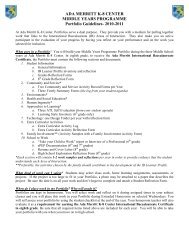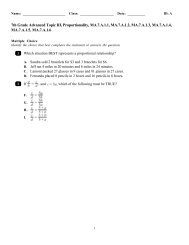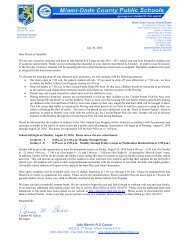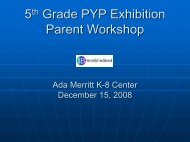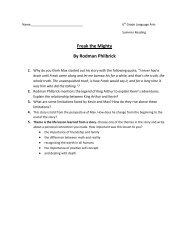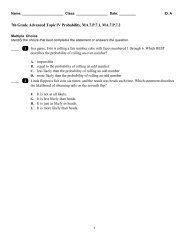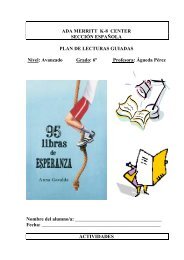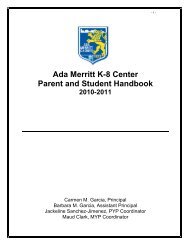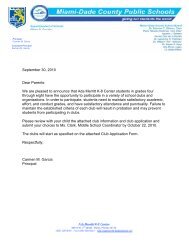Parent and Student Handbook - Ada Merritt K-8 Center - Miami ...
Parent and Student Handbook - Ada Merritt K-8 Center - Miami ...
Parent and Student Handbook - Ada Merritt K-8 Center - Miami ...
- No tags were found...
You also want an ePaper? Increase the reach of your titles
YUMPU automatically turns print PDFs into web optimized ePapers that Google loves.
- 38 -implementing the Title I Program will distribute annually to parents, at the onset of the school year, the Title I ProgramNotification Letter, in a format, <strong>and</strong> to the extent practicable, in a language such parents underst<strong>and</strong>.G. <strong>Parent</strong> Orientation. Schools will conduct orientation meetings that provide information about school procedures<strong>and</strong> programs as well as opportunities for active participation. Additionally, schools in the Title I Program shouldconduct an initial Orientation Meeting at the onset of the school year (which may be held during the Open Housemeeting/orientation) to inform parents of their school’s participation in the Title I Program, to explain the parentalrequirements in Section 1118 of The No Child Left Behind Act of 2001, <strong>and</strong> to explain the Rights of the <strong>Parent</strong>s to beinvolved.H. Educational Excellence School Advisory Councils.Schools must ensure that parents are included as active members of Educational Excellence School AdvisoryCouncils <strong>and</strong> other important decision-making bodies as required by federal <strong>and</strong> state statute. To ensure that parentsare knowledgeable about this involvement, all parents must receive information regarding the role of EESAC, meetingschedules, <strong>and</strong> parent elections. With the support of the EESAC, principals will develop <strong>and</strong> support strategies thatfacilitate opportunities for all parents to be involved in at least one support activity during the course of the year.I. Title I School-<strong>Parent</strong> Compacts. Each school implementing the Title I Program shall ensure that parents in theProgram are involved in jointly developing, <strong>and</strong> that they receive, the annual Title I School-<strong>Parent</strong> Compact asrequired in Section 1118(d) of the No Child Left Behind Act of 2001 that outlines how parents, the entire school staff,<strong>and</strong> students will share the responsibility for improved student academic achievement <strong>and</strong> the means by which theschool <strong>and</strong> parents will build <strong>and</strong> develop a partnership to help children achieve the State’s high st<strong>and</strong>ards.J. Title I School’s <strong>Parent</strong>al Involvement Policy. In each school implementing the Title I Program, parents shalljointly with the school create a policy which incorporates the existing M-DCPS School Board Rule 6Gx13- 1B-1.012,<strong>Parent</strong>al Involvement – A Home-School-District Partnership, <strong>and</strong> which describes how the school will carry out theparental involvement requirements in Section 1118 of TheNo Child Left Behind Act of 2001. This amended document will serve as the Title I School’s <strong>Parent</strong>al InvolvementPolicy. Additionally, parents in the Title I Program shall be involved in the annual evaluation <strong>and</strong> redesign of thecontent <strong>and</strong> effectiveness of this document, in efforts towards improving the academic quality of the school.K. Learning Opportunities for <strong>Parent</strong>s. With the assistance of The <strong>Parent</strong> Academy <strong>and</strong> other appropriate Districtoffices, schools should identify <strong>and</strong> implement community-centered, parent friendly programs <strong>and</strong> affiliations forparents to learn. The learning opportunities should target appropriate student age levels, including the needs ofchildren from birth to age six as well as the developmental <strong>and</strong> cognitive needs <strong>and</strong> expectations of students.Additional learning opportunities should be provided for young adults, including those who are already parents, tolearn how to be effective parents.L. Volunteers <strong>and</strong> Tutors. Principals should utilize the special knowledge, abilities, talents, <strong>and</strong> cultural experiencesof parents to enhance school activities <strong>and</strong> experiences. In order to maintain a strong volunteer program, principalswill identify staff who will actively recruit, train, appropriately place, support, <strong>and</strong> monitor parents in instructional <strong>and</strong>extra-curricular programs. Volunteer procedures <strong>and</strong> forms will be made available throughout the year.M. Resources for <strong>Parent</strong>s. In order to assist parents, resources should be made available for check-out at theschool site, such as: audio/visual, print, computer, <strong>and</strong> web-based programs; "how-to" programs broadcast oneducational television <strong>and</strong> radio; pamphlets <strong>and</strong> books developed especially to aid the parent-as-teacher; copies ofcourse schedules <strong>and</strong> homework assignments; lists of grade level <strong>and</strong> course objectives; testing guidelines; <strong>and</strong>schedules. Additionally, the Title I H<strong>and</strong>book should be made available for check-out to parents of students in theTitle I Program.N. Advocacy. Schools, Regional <strong>Center</strong>s <strong>and</strong> the District will support parents to become advisors <strong>and</strong> advocates fortheir children. They will provide underst<strong>and</strong>able, accessible, <strong>and</strong> well-publicized opportunities as well as informationabout student <strong>and</strong> parent responsibilities <strong>and</strong> rights in order that parents may advocate effectively. Regional <strong>Parent</strong>Liaisons will provide information <strong>and</strong> assistance to parents of children with exceptionalities.III. DISTRICT LEVEL STRATEGIES AND RESPONSIBILITIESA. District <strong>Parent</strong> Resource Office. The Office of <strong>Parent</strong>al Involvement functions as a liaison with parents to providea District level point of communication for referral <strong>and</strong> direction on parental involvement issues. It is the primaryresponsibility of this office to promote parental involvement, facilitate implementation of this policy, <strong>and</strong> maintaincontact with various groups <strong>and</strong> individuals representing parents. The office will assist other programs in theimplementation of 6Gx13- 1B-1.012 parent involvement strategies. These programs will include The <strong>Parent</strong>Academy, Early Childhood Programs, Bilingual <strong>Parent</strong> Outreach Program, State <strong>and</strong> District-run Voluntary Prekindergarten(VPK) programs, <strong>and</strong> Title I Administration.B. <strong>Parent</strong> Involvement Training. The Office of <strong>Parent</strong>al Involvement, in cooperation with The <strong>Parent</strong> Academy, TitleI Administration, <strong>and</strong> other appropriate District offices, where applicable, will develop <strong>and</strong> provide training programs togive parents the information, tools, <strong>and</strong> resources on how to be successful advisors, advocates, <strong>and</strong> partners in thedecision-making process. The training programs must include assistance to parents to underst<strong>and</strong> such topics as theSunshine State St<strong>and</strong>ards, the FCAT <strong>and</strong> other assessments, the requirements of The No Child Left Behind Act,ways to monitor a child’s progress, <strong>and</strong> ways to work with educators to improve student achievement. The Districtshould also facilitate parent-to-parent training programs.C. Support for <strong>Parent</strong>al Involvement Strategies. Through the Office of <strong>Parent</strong>al Involvement, The <strong>Parent</strong>Academy, Title I Administration, <strong>and</strong> other appropriate District offices, the District shall provide the coordination,technical assistance, <strong>and</strong> other support necessary to assist schools in planning <strong>and</strong> implementing effective parentalinvolvement activities to improve student academic achievement <strong>and</strong> school performance as well as to build theschools’ <strong>and</strong> parents’ capacity for strong parental involvement as defined in the No Child Left Behind Act, section1118. Additionally, schools implementing the Title I Program will receive support <strong>and</strong> assistance through the following






